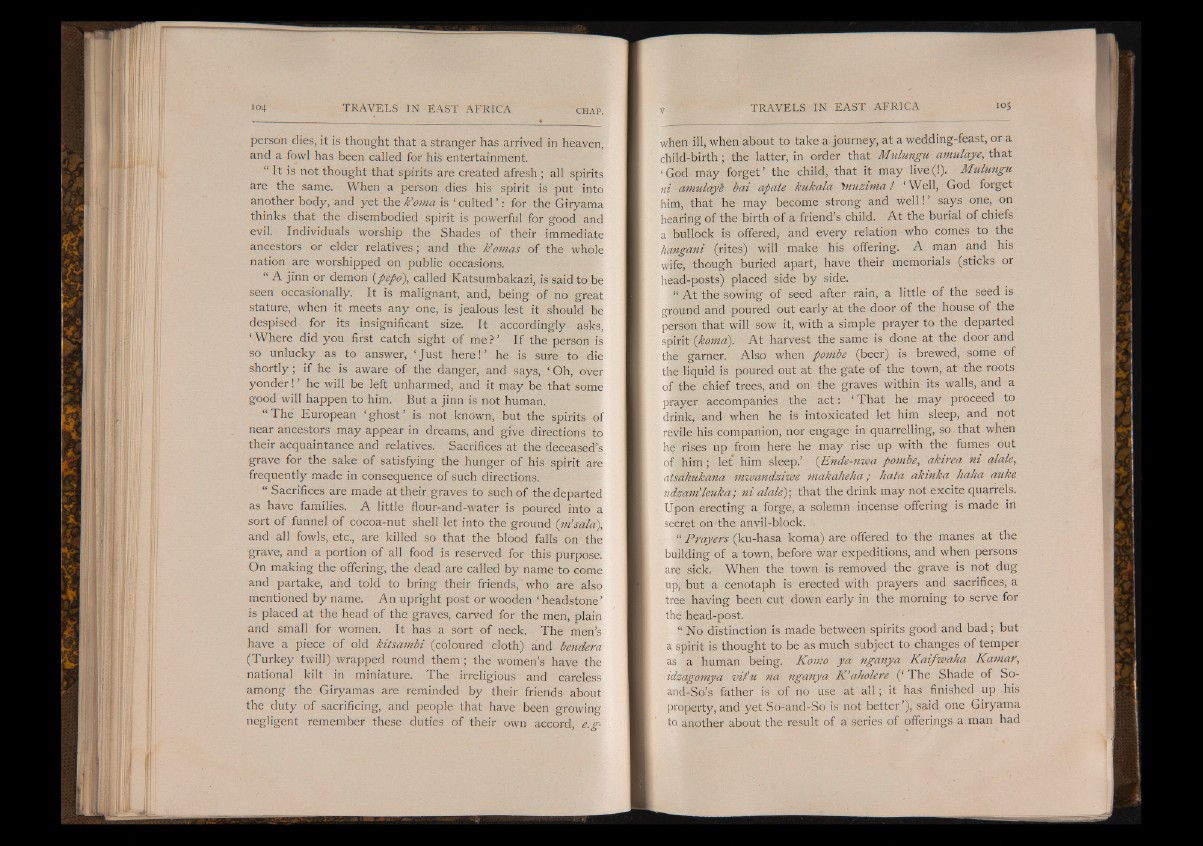
person dies, it is thought that a stranger has arrived in heaven,
and a fowl has been called for his entertainment.
“ It is not thought that spirits are created afresh ; all spirits
are the same. When a person dies his spirit is put into
another body, and yet the k ’oma is ‘ culted’ : for the Giryama
thinks that the disembodied spirit is powerful for good and
evil. Individuals worship the Shades of their immediate
ancestors or elder relatives; and the k'omas of the whole
nation are worshipped on public occasions.
“ A jinn or demon {pepo'), called Katsumbakazi, is said to be
seen occasionally. It is malignant, and, being of no great
stature, when it meets any one, is jealous lest it should be
despised for its insignificant size. It accordingly asks,
‘ Where did you first catch sight of me?’ If the person is
so unlucky as to answer, ‘ Just here!’ he is sure to die
shortly; if he is aware of the danger, and says, ‘ Oh, over
yonder ! ’ he will be left unharmed, and it may be that some
good will happen to him. But a jinn is not human.
“ Thé European I ghost ’ is not known, but the spirits of
near ancestors may appear in dreams, and give directions to
their acquaintance and relatives. Sacrifices at the deceased’s
grave for the sake of satisfying the hunger of his spirit are
frequently made in consequence of such directions.
“ Sacrifices are made at their graves to such of the departed
as have families. A little flour-and-water is poured into a
sort of funnel of cocoa-nut shell let into the ground \m’sala),
and all fowls, etc., are killed so that the blood falls on the
grave, and a portion of all food is reserved for this purpose.
On making the offering, the dead are called by name to come
and partake, and told to bring their friends, who are also
mentioned by name. An upright post or wooden ‘ headstone ’
is placed at the head of the graves, carved for the men, plain
and small for women. It has a sort of neck. The men’s
have a piece of old kitsambi (coloured cloth) and bendera
(Turkey twill) wrapped round them ; the women’s have the
national kilt in miniature. The irreligious and careless
among the Giryamas are reminded by their friends about
the duty of sacrificing, and people that have been growing-
negligent remember these duties of their own accord, e.gwhen
ill, when about to take a journey, at a wedding-feast, or a
child-birth; the latter, in order that Mulungu amulaye, that
‘ God may forget’ the child, that it may live(!). Mulungu
ni amulayl bai apate kukala 'muzima! ‘Well, God forget
him, that hq may become strong and well!’ says one, on
hearing of the birth -of a friend’s child. A t the burial of chiefs
a bullock is offered, and every relation who comes to the
hangani (rites) will make his offering. A man and his
wife, though buried apart, have their memorials (sticks or
head-posts) placed side by side.
“ At the sowing of seed after rain, a little of the seed is
ground and poured out early at the door of the house of the
person that will sow it, with a simple prayer to the departed
spirit {koma). A t harvest the same is done at the door and
the garner. Also when pombe (beer) is brewed, some of
the liquid is poured out at the gate of the town, at the roots
of the chief trees, and on the graves within its walls, and a
prayer accompanies the a c t : ‘ That he may proceed to
drink, and when he is intoxicated let him sleep, and not
revile his companion, nor engage in quarrelling, so. that when
he rises up from here he may rise up with the fumes out
of him; let him sleep.’ (Ende-nwa pombe, akirea ni alale,
aisdhukana mwandziwe makaheha; hata akinka haha auke
udzam'leuka; ni alale)-, that the drink may not excite quarrels.
Upon erecting a forge, a solemn incense offering is made in
secret on-the anvil-block.
“ Prayers (ku-hasa koma) are offered to the manes at the
building of a town, before war expeditions, and when persons
are sick. When the town is removed the grave is not dug
up, but a cenotaph is erected with prayers and sacrifices, a
tree having been cut down early in the morning to serve for
the head-post.
“ No distinction is made between spirits good and bad; but
a spirit is thought to be as much subject to changes of temper
as a human being. Komo ya nganya Kaifwaha Kamar,
idzagomya vit'u na nganya K ’aholere (‘ The Shade of So-
and-So’s father is of no use at a ll; it has finished up his
property, and yet So-and-So is not better’), said one Giryama
to another about the result of a series of offerings a man had